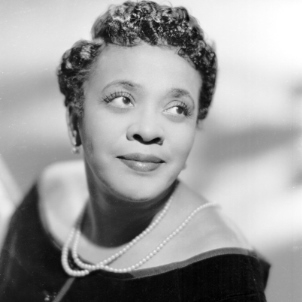

Moms Mabley was one of the greatest comedians of all time. She is widely regarded as one of the most important African-American entertainers and as the first bonafide female stand-up comedy superstar. At her peak she was making ten thousand dollars a week for stage appearances alone. Moms was one of the first, perhaps the first, to advocate for civil rights from a comedic perch. The social issues that boiled over in the late sixties were something Mabley had been addressing for decades. When the struggle against war, racism and varied discrimination became the focus of a new generation, Mabley suddenly found herself a bigger star than before, her message embraced by those involved in the fight.
Television programming geared to the new youth market regularly booked Mabley and white viewers discovered the joy that the Black community had known about for years. The Smothers Brothers Comedy Hour booked Mabley several times. So did ABC’s Music Scene. Mabley convinced her audience that she was a harmless, placid grandmother. By the time she left the stage, she had lectured on war, segregation and a racist society she had fought her entire life.
The details of Jackie Mabley’s upbringing are unpleasant. Her biological father died in a car accident when she was eleven years old. Less than two years later her mother, who had re-married, was hit by a truck and died. She was primarily raised by her grandmother. “My granny was a slave,” she explained. “She did all her cooking in her fireplace … she told me, ‘Child, you look into that fireplace and see the future in those flames, cause you’re gonna see the world like your granny never did.”
By the age of fifteen she had borne two, some say three, children. “I was raped and everything else,” she explained. The children were given up for adoption. Her stepfather, acting as her only guardian, forced her to marry a man much older than she was and whom she did not like.
At the prompting of the vaudeville team Butterbeans and Susie, she moved to New York City in the early twenties and found herself in the the Harlem Renaissance. In 1931 Mabley exercised her writing ability when she collaborated with Zora Neale Hurston. Together they wrote a play titled Fast and Furious: A Colored Revue in 37 Scenes.
Moms Mabley’s fame exploded during the comedy record boom of the early sixties. Her first vinyl appearance came a few years prior with the 1956 Vanguard Records release A Night at the Apollo. The album is a fascinating social document with liner notes written by Langston Hughes.
June 15, 1968, Moms hit a milestone when she was double billed with Hugh Masekela’s Quintet for two shows at Carnegie Hall. In the middle of filming Amazing Grace (1974), Moms Mabley had a heart attack. Her doctors pleaded with her to slow down. She refused. “Moms will never retire. As long as I live I will never be too old … Moms is going to stay in show business.” Even so, she had to cancel a series of engagements when “she was confined for 10 days to the White Plains Hospital.”
On May 23, 1975, the all-time record holder for appearances at The Apollo passed away at the age of 81. Dick Gregory delivered the eulogy at her funeral. He spoke to the large crowd of notable showbiz figures. “Had she been white, she’d have been known fifty years ago.”
